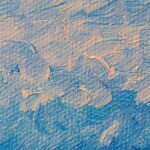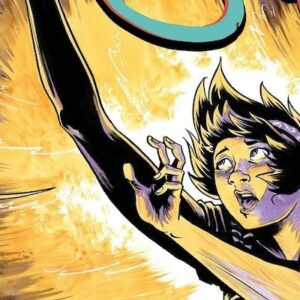Faith, Witches, Grief, and Smoke: New Poetry Books to Read in February
David Woo Recommends Seven Collections to Add to Your TBR
“I want children,” insists the transmasculine speaker in Cyrée Jarelle Johnson’s Watchnight, “wise black children / who are close to their mother, the black earth.” Representing several generations, the poets in this month’s releases approach the theme of the child—birth, childhood, the fact of being someone’s offspring—in their own indelible ways.
Tracy Fuad’s speaker, expecting a child, has a dream of her baby pressing “its face against the inside of my body / so hard that I could see its features through my skin,” while Gregory Pardlo’s speaker reproaches a father for the choice of circumcision: “He felt the threat a son implies, and took you, my infant / virility, scarf-skin like a halo, angel of my innocence / fore-fledged.”
With a mother’s tenderness Katie Peterson appeases the fear that a child feels on an outing at the beach: “Little fear, rest, I said to my child, / the waves crash too far out to be interested / in you.” When Sarah Ghazal Ali writes, “Father prayed / for a son, I revised myself // a daughter,” the crucial act for the young poet shoring up an identity is “revision.” And Dorianne Laux, celebrating her 70th birthday in her new book, shows how a poet always remains her mother’s child: “Now I feel her warm breath / on my neck summer nights, peering / over my shoulder as I write every poem, whispering / Let me in. I let her in.”
*
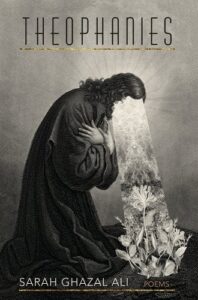
Sarah Ghazal Ali, Theophanies
(Alice James Books)
Informed by the cadence and stories of the Qur’an and the Bible, from Eve and Magdalene to Maryam and the poet’s namesake Sarah, the poems in this elegant debut collection manifest the ways in which faith is “a legacy // of echoes—every echo / a reflection of voice.” Her crisp yet open-ended explorations of coming of age find poetic intersections between the sacred texts and such matters as womanhood, sexuality, family, and the 1947 Partition that separated Pakistan from India.
The speaker’s faith invites difficult understandings, as when she speaks of “the formless // God my father never joins me / in believing” and of his difficulty with her wearing a veil (he calls her “brainwashed”). But with the ravenousness of one searching for truth and meaning (“Often I confuse theophany and theophagy”), she dares to probe the boundaries between the sacred and the human. “Like God, I’ll create in my image,” she writes, and the complicated honesty of a young person learning the ways of desire and love leads her to describe a first lover as both Adam and a god: “I was penitent, / but not before he entered again, / and again, the Lord / I briefly believed, his body / above me an eclipse.”
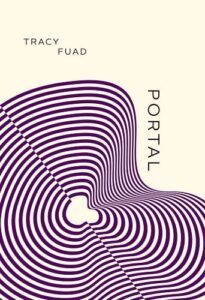
Tracy Fuad, Portal
(University of Chicago Press)
“I generated faces of people that didn’t exist,” Tracy Fuad writes, “and found that I already loved them.” The one beloved person that the speaker generates, like the wormlike figure of a sonogram, is her soon-to-be-born baby, and the “portal” of the title is both birth itself and the liminal spaces where true meaning is born: in the roots of words (“Worm, from the hypothetical root wer-, to turn, to bend”), in the accidental things of this world (the roses of Cape Cod arriving from a shipwreck), in the linguistic otherness of an Anglophone visitor to Berlin, and in the existential doubt that one must undergo (“the seeds of a nihilism with which I was once well acquainted”) to attain sense and value.
The method is often propulsive but blithely concatenated and sometimes uproariously amusing, as in the poem “Business,” which moves from a grandfather’s garbage company, American Refuse Systems (ARS), to the fact that “arse” was “once considered a polite term for buttocks” to a view of Neanderthals in the Neander Valley. That the reader imagines Fuad telling these stories to her future child inclines the book from the familiar intellectual atrophy of our era (“I could barely think / if I couldn’t also Google”) to the vaster, sacral perceptions she finds, at last, in the birth portal itself: “And the unbowing was there. / And the ecstatic, a humming. / And a great sorrow was there.”

Cyrée Jarelle Johnson, Watchnight
(Nightboat Books)
“We live a life with no margin of error and an open vein as a safety net,” writes Cyrée Jarelle Johnson in “psychedelia,” the visionary prose centerpiece of Watchnight, winner of the James Laughlin Award from the Academy of American Poets. The open vein refers to the injections of testosterone (“T”) that the speaker and his transmasculine community need in order to become the body that they “claim,” the one “named otherwise everywhere else.” While evoking the lived-in specificity of “the weird, fraternal world of trans guy friendship” and the speaker’s work at “the Red, Blaq & Greens Urban Farm,” Johnson’s vision constructs a wider “culture that mirrors what we lost,” an America devastated by inequality, plague, and climate change: “Our we fragmented, atomized, and blown away.”
Johnson’s versatility is evident as well in his shorter poems, which engage with forms like the sestina and the Brownian duplex. As with another new collection I can recommend, V. Penelope Pelizzon’s A Gaze Hound That Hunteth by the Eye (University of Pittsburgh Press), previewed by Rebecca Morgan Frank in our January Literary Hub piece, Watchnight restores some of the circulation to the occasionally bloodless wing of American poetry inspired by traditional meter and rhyme.
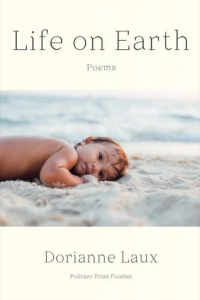
Dorianne Laux, Life on Earth
(W.W. Norton)
“To think we can eat a sunset,” Laux writes joyously of a peach. Composed as she turned 70, these poems seek to “accept joy, those unbidden / moments of surcease,” strangely inseparable from the cessations of death. In vivid memories of departed loved ones, especially a free-spirited, alcoholic mother and a drug-addicted sister, she employs a direct, colloquial storytelling structured through the volatile cadences of metaphor. The mother’s shoe presses the treadle of her Singer sewing machine, revealing the word “SIN.” The sister, taken away by the police, is “naked / as a jaybird, screaming /like a banshee, cursing / like a sailor,” as if only the cardinal poetic sin of the cliché could do justice to the mortification of the memory.
If Laux admits some indifference to such sophisticated poets as John Ashbery, Zbigniew Herbert, and Anne Carson, she knows how much our cultural assessments are limited by our own cosmic telescopes, for which “we can’t grind a lens big enough to see.” Like most poets, she prefers these poets when they write in modes most like her own, subtly enjoining us to gaze receptively in her direction. What we see when we do: a movingly repetitive lyric about environmental collapse (“The birds are going, the bees are almost gone”), a piquant vision of French toast as a paean to her Acadian ancestors, a lived-in description of working-class drudgery (“Waitress”), and a wise, disillusioned piece about her 70th birthday: “I want to die bent // to the tide, lifting a shell to my ear.”
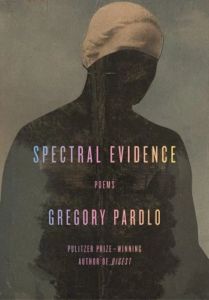
Gregory Pardlo, Spectral Evidence
(Alfred A. Knopf)
If “spectral evidence” was a witness’s nightmares that were admissible as proof of the devil’s presence among the accused witches at the Salem trials, Pardlo employs the term to trace how otherness is demonized, not only in the “via negativa” of Black people’s bodies or the “excited delirium” that presages death by police taser but in the fears, instilled by a patriarchal upbringing, that thwart a man’s understanding of himself and others: “For what could I do but fear when // life’s theater is full of ghosts and mirrors and baleful /peacock feathers?” This collection, Pardlo’s first since the Pulitzer-winning Digest, seeks to wrench these false specters into the light of openness and authenticity.
Guided by such figures as Tituba in her crafty deflections of her Salem accusers, Piero’s austere Madonna del parto, and an Upper East Side therapist whom he calls Teresa Ávila, the speaker questions the ways in which he has become a man, as when he vividly recalls a mortifying incident where his father came upon him during an act of auto-eroticism that left him demonizing himself: “My macho cowardice would not let me / recognize that boy as me.” If there is so “much to unlearn: old selves and my /toxic attachments to them,” this book shows how the work of learning, unfettered, erudite, can initiate the process of remaking the self and the world.
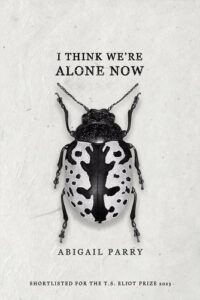
Abigail Parry, I Think We’re Alone Now
(Bloodaxe Books)
“I do believe in grief,” writes the British poet Abigail Parry in her second collection, “and grief as aperture, and aperture / as how we see ourselves see each other / and it’s late.” An allegiance to this belated aperture of grief may underlie her poetic vision, but a mind attuned to “each mental irk and imp” lifts her poetry into an ironic bliss, like the earworm pop song of the title, which can read as a “unicursal not-quite-circuit” about a very young couple escaping to a trysting place for the dubious pleasure of finding something gestural and performative, their true aloneness.
If Parry’s territory is “a strip of dark I recognise / with the crackshot, eyeless knowing of the nerves,” it holds the nervy, unnerving recognitions that make melancholia something apperceptive and beautiful, like the way in which an atlas of the rat’s brain contains no “rat-thoughts,” just “isthmuses and commissures, and junctions and rhombomeres, / all jigsawed into place” or how a knot’s “turnabout, intrinsicate/ dark world” summons “the stopstart jig of how and when to want, / when to resist, / when to let go.”
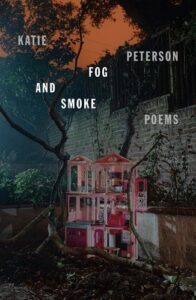
Katie Peterson, Fog and Smoke
(Farrar, Straus and Giroux)
In a meditation on California fog, Peterson writes, “It was made of water, but not helpfully, / a stag walked inside,” which a car might crash into. With an unadorned clarity of phrasing, she holds the elusive substance up to the light and registers what it means for the matter of the world both to evade and model human perception and intercept the numinous: “It’s like God—it disappears. / It wants us to see ourselves. / Its absence is clear.” The speaker traces these evanescent qualities—the fog and smoke of our emotions and judgments—in an American landscape beset with drought and wildfire, in a fictional account of the affair between Hannah Arendt and Martin Heidegger, in the self-expressive beauty of a spider web (“the tension / in the web, the focused / light”), and in her love for her family.
With ramifying concision, she shows how the differences that marriage summons can combine two people into a graceful unity. “You climbed the mountain with me, a recovering / moralist,” the speaker says, addressing her husband. “You wanted to stay / on the path, I wanted to find it.” And with the daily wisdom that a sensitive, loving parent uncovers, she finds the life lesson in teaching the alphabet to her young daughter: “it was fundamental / to the alphabet that a person could be wrong. / It was buried deep in the activity, / like the idea of virginity.”















